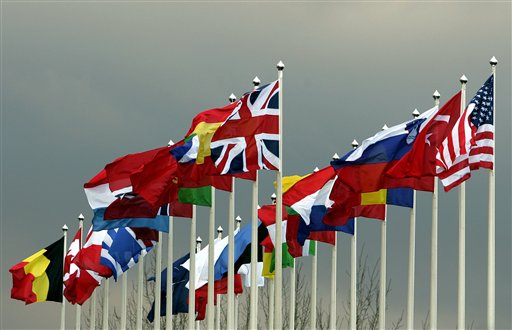
…Whether an internationalist or isolationist approach, there are some alliances that will be strategically vital…
President Obama, in 2011, once declared that “We don’t have a stronger friend and stronger ally than Nicolas Sarkozy, and the French people.”
The quote delighted the French and irked the British with some Americans also bewildered by the comments.
Nile Gardiner, Director of the Margaret Thatcher Centre for Freedom at the Heritage Foundation think-tank, responded at the time: “Quite what the French have done to merit this kind of high praise from the U.S. President is difficult to fathom […] to suggest that Paris and not London is Washington’s strongest partner is simply ludicrous.”
More than a decade since President Obama’s comments, several allies have been declared in various ways to be America’s ‘best ally’ or ‘strongest friend’ by subsequent presidents. The reality is the U.K. and Canada may be our most consistent and strongest allies, but the changing dynamics of military and economic power on a global stage through the decades require the U.S. to constantly rethink its alliances.
The constant rethink raises the usual debate between internationalism and isolationism, which is already playing out in the Republican primary and will flow into the presidential debates in 2024. Regardless of perspective, the U.S. will need allies – even if transactional – with the following five countries being the most strategically vital to any American foreign policy in today’s world.
Japan
Japan could be to the U.S. in the 21st century what the U.K. was to the U.S. in the U.K. in 20th century…
Japan’s importance to the U.S. today rivals the importance of the U.K. in the 20th century. First, the U.S. and Japan are the #1 and #3 largest economies in the world. Secondly, Japanese military spending, including for longer-range missiles that can strike targets in China or North Korea, is expected to double over the next five years. Japan continues to support Ukraine and has sanctioned Russia while also increasing Japanese military presence on the islands closest to Taiwan. These stances, especially those acts hostile to China, altogether break from the more subtle approach (or “self-constraint”) normally demonstrated by Japan for much of the post-World War II period.
Third, Japan was a driving force for the revival of the Quad, a four-way partnership involving Australia, India, Japan, and the U.S., which helped the U.S. regain some influence in the region (after dropping out of the Trans-Pacific Partnership (TPP) under former President Donald Trump) and avoid what former Japanese Prime Minister Shinzo Abe described as an impending formation of “Lake Beijing.”
Most importantly, Japan and South Korea have sought to bury the hatchet as part of the Pacific trilateral discussions with the U.S. If Japan continues to strengthen its military and defense capabilities, stabilize and grow its economy, and become the formidable counterbalance to China for the U.S. (while working alongside other Indo-Pacific partners), then it may be to Asia what the U.K. was to Europe in the 20th centuries in more ways than the U.S. could have imagined decades ago.
Australia
Australia is an underrated and underappreciated ally for the U.S…
Secretary of State Anthony Blinken recently declared “We [America] have no greater friend, no greater partner, no greater ally than Australia” – as we have seen, American political leaders can be promiscuous with this type of language. Nonetheless, Secretary Blinken is not wrong to emphasize the importance of Australia as the U.S.-Australian alliance is the foundation of U.S. Indo-Pacific policy. The U.S. protects its biggest non-NATO ally, not because of its massive population (approximately 27 million) but rather because of shared beliefs in democracy and freedom, while Australia aligns with the U.S. on security and balance of power issues. Proponents of the alliance have long argued that Australia can rely on the American extended nuclear deterrence, which is a concept that the U.S. would protect Australia with nuclear weapons if the country is threatened or faces a nuclear attack.
It was not so long ago that the debates in Canberra were centered on Washington’s commitment to Asia and its ability to address both the economic and national security challenges of the region. Yet, China’s rise and American focus on Taiwan has created another meeting of the minds (similarly seen with the U.S. and Japan). Today, polling, according to The Economist, shows 87% of Australians support the U.S. Australian alliance despite 77% of Australians believing the alliance will likely draw Australia into a war not in Australian interest. You likely cannot find a similar poll on any other U.S. alliance. To be fair, Australia sent its troops to fight alongside the Americans in Korea, Vietnam, the Gulf War, Afghanistan, and Iraq, and the country hosts the U.S. marines…many Americans have little knowledge of this history.
Australia’s bilateral security arrangements with Japan are vital to the shared interests of the Quad. Australia has also been a driving force (alongside Japan) in the “new Quad”, a four-way partnership involving Australia, Japan, Philippines, and the U.S, with the new Quad again being a clear reminder that there is no Indo Pacific policy without Australia (and Japan).
Germany
Has the war in Ukraine forever changed Germany?
The U.S. requires a partner in Europe. For years, it was unthinkable to imagine any relationship in Europe being more important than the U.K. But a lot has changed the dynamics in Europe – for example, Brexit, economic struggles in the U.K, and former President Obama’s perceived preference for other European allies (such as Germany and France) among other things. Brexit weakened the British influence in Europe while its weakened economic stance in recent years hampers its leverage on an international stage. But let’s not ponder why the U.K. is not the preferred ‘strategic’ partner and try to focus on why Germany should be.
German chancellor Olaf Scholz is not Angela Merkel (who former President Obama appeared to appreciate and former President Trump appeared to find frustrating) which is perfectly okay. Scholz has focused Germany on meeting the 2% NATO spending threshold for his budget and has been supportive of American and European efforts in Ukraine via weapons and money. Through a series of legislation on Ukraine, energy, and trade, he has fundamentally shifted German foreign policy and squashed the narratives of Germany “free riding” on U.S. defense spending and Germany playing a selfish game of economic footsie with Russia and China.
Today, Germany is working alongside France to create a more forceful and responsive European Union with German troops likely to be deployed on the eastern front of Europe as deterrence to Russia. Scholz’s governing alliance faces challenges from extremists in German politics at home, but that is a growing concern for most of Europe. Merkel and Scholz, if anything, are showing the dynamism of German politics and its increasing ability to meet the challenges of a changing Europe.
Saudi Arabia
Can the U.S. and Saudi Arabia find the right trade-off between oil, nuclear energy, and security (among a few other things)?
The fist bump seen around the world has not exactly healed all wounds. The Biden administration is still working to convert the Biden-MBS rendezvous in the desert into actual results. A monumental normalization deal between Saudi Arabia and Israel (underwritten by U.S. security guarantees, promises of nuclear energy, and some agreement on oil) remains the ultimate goal, but it sits on the backburner until the war in Gaza comes to an end with a solution that appeases both the desires of Saudi Arabia and Israel (with the U.S. also likely playing some form of a mediation role).
Critics argue that the normalization deal is a manifestation of today’s transactional relationship between Saudi Arabia and the U.S. with both countries struggling to find mutual geopolitical interest over time – the “oil for security” agreement (which also sounds transactional) slowly died with the shale revolution in the U.S. and former President Obama’s vow to focus on Asia. Former President Trump, if anything, strategically leveraged the transactional nature of the relationship in his foreign policy, which initially resonated in Saudi Arabia (and the United Arab Emirates). It was Iranian drone attacks on maritime and energy targets in Saudi Arabia in 2019 (and threats against Dubai and Abu Dhabi) coupled with increasing Iranian demonstrations of power via drone sales to Russia (to be used in Ukraine) and proxy militias (in Lebanon and Yemen) that reminded Saudi Arabia and the U.S. that Middle East security cooperation is vital.
A coordinated approach on oil and energy transition will remain a focus item in the immediate future. Saudi Arabia will be focused on navigating the recent Cop 28 deal on reducing fossil fuels while all U.S. presidents know Americans hate high gas prices (and punishes presidents at the polls for such prices). Other priority issues, including Gaza and Ukraine, obviously require collaboration. The biggest change in this relationship, however, may simply be the U.S. accepting (and respecting) the arrival of Saudi Arabia onto the global stage in energy, international policy, and sports among various other things.
France
France is the U.S.’s oldest ally…
Benjamin Franklin travelled to Paris in 1776 to establish an alliance with France and the rest is history with France providing supplies, weapons, and military support to the U.S. in its fight for independence. France has fought alongside the U.S. in world wars, Korea, Afghanistan, and Iraq. It is no secret that some of those wars created rough times for the French-American relationship yet the French have been a loyal partner.
France is also still very proactive in the Indo-Pacific alongside the U.S. despite the loss of a major submarine deal with Australia in 2021 to the U.S. (a deal viewed by France as a backstab by both the U.S and Australia). France continues to discuss arms sales with countries, like India and Malaysia, with aspirations to fill a space likely to be created by Russia if the war in Ukraine continues and weapons sales by Russian have to be scrapped in favor of redirecting arms to support their efforts in Ukraine. French President Emmanuel Macron also recently signed a law affirming that France would protect the freedom of the Taiwan Strait and has sent delegations to Taiwan to fortify that relationship. Both acts coupled with French engagement with Japan (and a reconciliation with Australia) makes France a strategic ally to the U.S. in Asia. Lastly, once Macron gave up on the potential for a Nobel Peace Prize and stopped calling Russian President Vladimir Putin on Ukraine, he aligned with Germany on creating a stronger and independent European Union. “Independent” may sound like a pushback against the U.S., but French actions suggest the France-U.S. bond can last for many more decades.
